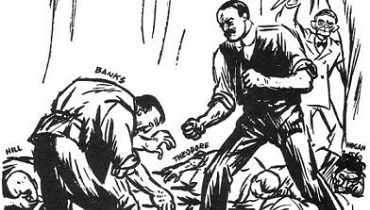The Australian Alert Service is the weekly publication of the Australian Citizens Party.
It will keep you updated on strategic events both in Australia, and worldwide, as well as the organising activities of the Citizens Party.
To subscribe to the Australian Alert Service, it's easy, and it's secure.
Lead Editorial
1 May 2024
Vol. 26 No. 18
In another victory for the bank branch closure Senate inquiry process, Westpac consumer bank chief Jason Yetton yesterday promised to extend the bank’s moratorium on regional branch closures for a further three years, until 2027, the Australian Financial Review reported 30 April.
“Westpac’s extension of a moratorium on the closure of around 186 rural branches comes as the Senate Rural and Regional Affairs and Transport References Committee inquiry into bank closures in regional Australia prepares to report on May 16”, wrote AFR.
Focusing on the bank’s need to “improve services”, Yetton admitted: “We’ve heard the feedback from customers about the impact of branch closures in the bush and understand they face many challenges such as limited internet connectivity and increased travel times to their nearest branch.”
Yetton claimed the extension was about recognising that many customers “prefer to do their banking in branch access to face-to-face service for their banking needs and cash transactions”, but there is no doubt the banks are motivated by fear of what the Senate committee will recommend in 15 days from now. The Big Four know it could be much worse than being forced to keep branches open: Their nightmarish vision of a public competitor dredges up the same decades-long fight, of the 1930s-50s, when the “old” Labor Party dared to make banking work for the public good. The same spectre was raised by the public backlash to Treasurer Jim Chalmers’ proposed legislation to give up democratic authority over the Money Power by making the central bank unaccountable to elected government.
The committee’s assessment will form a critical intervention in this historic battle, but not the final word. As on the war front, the constant pressure of truth, ideas and solutions forces change, but sometimes it moves invisibly beneath the surface and sometimes it emerges dramatically.
In the USA, the anti-war ferment has emerged dramatically in support of the people of Gaza, with protests by young people spreading across American college campuses, evoking anti-Vietnam War imagery. A CNN poll has revealed that 71 per cent of citizens disapprove of President Biden’s Israel policy, a rate which soars to 81 per cent in the 18-34 age group. In an election year, this is putting significant pressure on Biden. The sentiment—against Biden, Israeli PM Netanyahu, and their supporters— is growing globally.
In Australia, a note of truth regarding the Ukraine war has finally sounded in the major press. Even as Australia pledged more assistance to Kiev, historian James Curran, now the AFR’s international editor, admitted in his 28 April column that the Ukrainian army is “out-manned and out-gunned”. Continued support will only fulfil the claimed Anglo-American/NATO intention to “fight to the last Ukrainian”, the title of his article. But Australia, he wrote, “again marches in lock step with the American coalition”.
Like Ukrainians and Palestinians, all the world’s citizens are considered acceptable collateral damage in a broader war which is aimed at maintaining Anglo-American hegemony. That hegemony cannot be saved, because a new economic and financial order—an ever-so-slightly better option than thermonuclear world war—is winning the support of the global majority.
This betrays the reality that the economic fight is foremost: As George Washington affirmed in a 1779 letter, the bankers and speculators “work more effectually against us than the enemy’s Arms and are a hundred times more dangerous to our liberties and the great cause we are engaged in”. It is why Abraham Lincoln in the US Civil War counted Wall Street as his ultimate enemy and why he decided to invest in the Transcontinental Railroad while the war was ongoing. It was crucial to reinforce the economy and unify the nation, as was also understood by our own wartime leaders, John Curtin and Ben Chifley, who in order to save the Australian economy, enraged the City of London “Money Power” by breaking the control of the private banking cartel. That is our fight.
In this issue:
- Don’t accept the major parties’ social media censorship agenda
- Were Christine Holgate and Australia Post victims of a medicated prime minister?
- Albanese gov renews push for global internet censorship
- ASPI, a Seven ‘exclusive’ and a think tank gravy train
- Murdoch war lies machine sinks boot into Assange
- The real problem is Western undercapacity, not Chinese ‘overcapacity’
- Who do you call? The Citizens Party!
- The state bank model for a public housing developer
Click here to find out how to subscribe. For freely available AAS articles, click here.
Click here for the archive of previous issues of the Australian Alert Service








